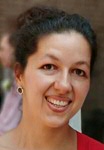Current PhD projects in Theoretical and Empirical Linguistics

Emotion Expression and Interpretation in Multilingual Psychotherapy
Language is an essential part of psychotherapeutic work. In psychotherapy involving more than one language, achieving the most beneficial therapeutic process and outcome can be facilitated by acknowledging the impact of therapist’s and client’s language(s). This research aims to explore the role of multilingualism in emotion expression and interpretation in psychotherapy offered by multilingual therapists. In this project, the main focus lies on the importance of investigating multilingual phenomena (e.g., language mixing, code switching, etc.) in psychotherapy and making explicit the Dutch therapists’ implicit, experiential knowledge of allowing multiple languages in the room. This study will establish which multilingual phenomena are present in emotion expression and interpretation in psychotherapy in the Netherlands and how increased linguistic awareness among multilingual therapists can contribute to their work with multilingual clients.
Documentation for the early West Germanic languages
Adverbs of degree (boosters like very and downtoners like hardly) make up an important part of the lexicon of most languages. Their usage is bound by a variety of restrictions, and they are highly prone to undergo change in usage, though this may be a relatively recent phenomenon. While their usage has been documented for the Modern Germanic languages, their historical counterparts have not yet had a systematic description. This project will provide documentation for the early West Germanic languages, and it will determine their rate of change in these languages, which will contribute to the study of lexical evolution.
Language attitudes and ideologies of Indigenous language speakers
In my PhD research project, I am investigating the language attitudes and ideologies of Indigenous language speakers in Australia and Chile towards the use of their languages on digital platforms, specifically platforms that have as aim the revitalisation of languages.
Since the advance of digital technologies, these have represented a potentially wonderful opportunity to support language revitalisation work and increase digital language diversity. The presence of Indigenous languages (i.e., the language of Indigenous peoples) in the digital realm has represented an access point to these languages for many communities whose languages have been confined to very few domains, lowering -for decades- their instrumental value and prestige. Through a qualitative analysis - and based on collaborative work with representatives of Indigenous communities in the New South Wales area and the Araucanía Region- this research project seeks to explore the dynamics behind the interaction with such tools in language revitalisation contexts, the possible impact on the vitality of Indigenous languages and on the identities of these communities.
Design a minimalist version of the Theta Theory
The relationship between predicates and their arguments is traditionally captured in Chomsky’s Theta Theory (1981), although many other versions of this theory have been proposed since then. These traditional accounts rely heavily on additional mechanisms outside of narrow syntax. The Minimalist Program (Chomsky 1993; 1995) aims to provide a framework that is as simple and elegant as possible. As such, the only mechanism to create dependencies, (e.g. the dependency between predicates and arguments) is Merge. Merge is an operation that orders elements into a hierarchical structure (Zwart 2009; 2017). In the present project I aim to design a minimalist version of the Theta Theory, where argument structure is a function of Merge.
My PhD research project examines how the 2013 German Federal Administrative Court decision (BVerwG 6 C 25.12) requiring Muslim students to attend coeducational swimming lessons in public schools exposed tensions between civil society and individual agency. The research touches on discourses about Islamic dress, social and national identity construction, the civil enculturation process, and political debates about foreignness, integration, and societal change. Using the court’s decision as a jumping-off point, the research examines the concept of ‘belonging’ in Germany with a focus on Islamic dress as a semiotic resource for meaning-making and the discursive framing of Muslim women in political, legal, and media discourse.

My project investigates whether lexical stress is a relevant factor in the distribution of phonemes. We compared the distribution of consonants in Spanish, English and Dutch words that start with either a stressed or an unstressed syllable, and the results undeniably show different distributional patterns for the two word types.
Columbia School Phonology (Diver 2012) uses the concept of word recognition to explain distributional patterns, and t he explanation of our results is based on the premise that stress information from the first syllable of a word facilitates word recognition in Spanish, English and Dutch. There is empirical evidence supporting this claim for English and Dutch (Cooper, Cutler & Wales 2002; Van Heuven 1988) , but but not for Spanish yet.
Therefore, we will carry out an adjusted replication of the Spanish word recognition experiment in Soto-Faraco, Sebastián-Gallés and Cutler (2001), in which the disyllabic primes will be replaced with monosyllabic primes.
The cognitive representation of change-of-state events in speakers of different languages
We are very used to use our senses to perceive the continuum of events happing around us, however, what is the role of language in this cognitive process? Several studies about motion, agency and labeling have found that language is especially important for increasing the salience of particular world features in our mind. Our research aims to examine the influence of using language-specific structures on the cognitive processes involved in the visual perception and mental representation of change of state events across language speakers. To investigate this, two matters need to be observed: a) which linguistic patterns do speakers across languages typically use to describe change of state undergone by objects, and b) by virtue of which cognitive processes do humans apprehend changes of state in the world. The central question directing this project is: to what extent does being habituated to describe changes of state by means of language-specific structures influence the performance of the cognitive processes involved in representing change-of-state events? We are looking into how attention allocation, memory, categorization and segmentation processes of Spanish, Dutch and Mandarin speakers may vary in function of specific characteristics of their mother tongue.
| Last modified: | 16 December 2024 3.06 p.m. |





